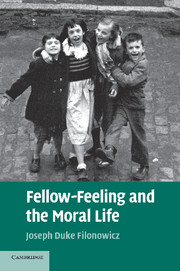Book contents
- Frontmatter
- Contents
- Preface
- Chapter 1 Fellow-feeling and ethical theory: the British sentimentalists
- Chapter 2 Ethical sentimentalism revisited
- Chapter 3 Shaftesbury's ethical system
- Chapter 4 Hutcheson's moral sense
- Chapter 5 What do we perceive by moral sense?
- Chapter 6 C. D. Broad's defense of moral sense theories in ethics
- Chapter 7 What is innate in moral sense?
- Bibliography
- Index
Chapter 4 - Hutcheson's moral sense
Published online by Cambridge University Press: 22 September 2009
- Frontmatter
- Contents
- Preface
- Chapter 1 Fellow-feeling and ethical theory: the British sentimentalists
- Chapter 2 Ethical sentimentalism revisited
- Chapter 3 Shaftesbury's ethical system
- Chapter 4 Hutcheson's moral sense
- Chapter 5 What do we perceive by moral sense?
- Chapter 6 C. D. Broad's defense of moral sense theories in ethics
- Chapter 7 What is innate in moral sense?
- Bibliography
- Index
Summary
A SAD TALE?
No account of the school of sentiment could fail to consider in detail the ethical writings of Francis Hutcheson (1694–1746). Hutcheson was the sentimentalist par excellence, if anyone was. But how successful was he at articulating and defending sentimentalism? Though I have never seen this question addressed head-on, I believe there is a widely accepted response implicit in the literature of history of ethics. It is, to state things bluntly, “not very well.” Why that should be the prevailing judgment is best expressed as a brief narrative of how things generally worked themselves out for the sentimental school, beginning in the 1720s.
Hutcheson was Shaftesbury's chief heir and systematizer among the British Moralists. He defended Shaftesbury's portrait of human nature and its ethical capacities against attack both from the earliest modern rationalists (Clarke, Wollaston, and Balguy) and the traditional natural law theorists and “voluntarist” religious moralists – all the while fending off Mandeville, the new popular spokesman for Hobbesian egoism and moral skepticism. Hutcheson is principally memorialized for making it almost his life's work, at least until fairly late in his literary career, to champion Shaftesbury's suggestion that we are moral beings by virtue of our having a moral sense or sense of right and wrong.
In doing so, Hutcheson introduced several awkward complications into what eventually became known as “moral sense theory,” which contributed almost from the very start to the historical decline of sentimentalism.
- Type
- Chapter
- Information
- Fellow-Feeling and the Moral Life , pp. 104 - 123Publisher: Cambridge University PressPrint publication year: 2008



